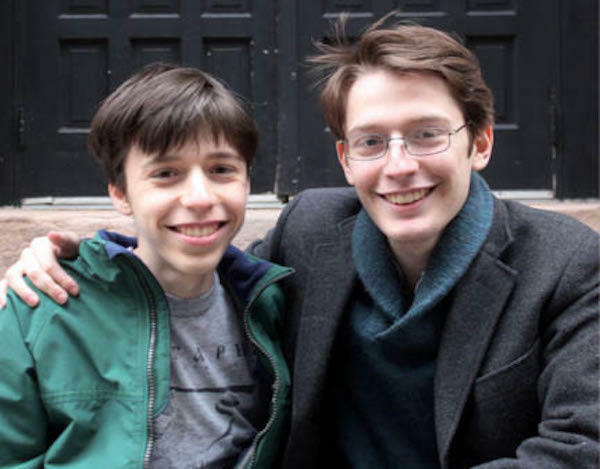Alumni Profile: Jeremiah & Isaiah Milbauer

Jeremiah Milbauer came to the Yiddish Book Center's Great Jewish Books Summer Program in 2015 because, he says, "I wanted more exposure to the Jewish themes that I'd been connecting to throughout my childhood." His younger brother, Isaiah—inspired by Jeremiah's rave reviews, not to mention a similar interest in exploring their family's cultural heritage—came to the program the following year.
Jeremiah recently finished his first year at the University of Chicago, where he served as dorm council president, joined the mock trial team, began learning the carillon, and took part in weekly programmer meet-ups; he's contemplating a double major in computer science and philosophy. This fall, Isaiah will be a senior at New York's Hunter College High School, where he's active in the Model UN, plays varsity baseball, runs an outdoors club, and writes a column for the school paper—including a recent piece, inspired in part by his time at Great Jewish Books, he says, "about the disappointing lack of recreational reading among high school students."
Pakn Treger: What was your favorite part of Great Jewish Books?
Isaiah: It’s hard to isolate one favorite moment. The entire experience was intellectually exhilarating and wonderful. I loved the talks given by a wide range of brilliant people; Ilan Stavans forever altered my understanding of the word book. I loved that I was surrounded by fantastic, genuine people who were truly passionate about learning. From gazing at the stars to late-night conversations, the informal periods of time were as wonderful as classroom time. I developed friendships that are still strong today. The residential assistants and teachers were also incredibly welcoming and awesome.
Jeremiah: I really liked having the academic experience of throwing myself into literature. It was the first time that I’d been in an environment where I could just turn to anyone next to me and have a conversation about something we’d been learning and thinking about alongside each other.
PT: What was your favorite thing you read?
Isaiah: I loved reading some of Irena Klepfisz’s work in Adriana Jacob’s seminar. A Few Words in the Mother Tongue really touched me, leading me to develop a more visceral connection with my Yiddish heritage.
Jeremiah: I also really liked A Few Words in the Mother Tongue. I like reading rambling emotional poetry, and I think Klepfisz did a really great job of capturing, or at least making accessible, the emotional connection to Judaism. I’ve also found that the Chelm story set in the Holocaust [Nathan Englander’s “The Tumblers”] has had a really big impact on how I deal with hardships in my life.
PT: Did anything surprise you about the program?
Isaiah: I was astounded by the experience I was able to have in just one week. By the end of the week, GJB felt like family, and I had vastly matured intellectually. The pure passion for intellectual discovery at GJB was also incredibly refreshing.
Also, the food was unexpectedly fantastic.
Jeremiah: I was surprised at how most of the texts we read managed to touch upon religious and cultural themes without much explicit participation in religion. Also, it was awesome how quickly everyone in the program bonded—after day three, it felt like we’d been there for at least a week or two!
On the very last day of the program, I was talking to Josh Lambert [the Center’s academic director and lead teacher] when I learned about optical character recognition efforts with Yiddish. The existence (and possibility of one day tackling) that cool and unsolved problem, residing at the intersection of my cultural heritage and my academic interests, evoked a very rich emotional response that really caught me off guard. I feel privileged to have learned about so many interesting things with so many incredible people.
PT: Did the program change the way you read or think about literature?
Isaiah: Before the program, I would often read without a pencil in hand. Now a pencil is always close by when I read. The program taught me to approach poetry as little wonderful presents that need to be unraveled. Also it truly emphasized for me the power literature can have on identity.
Jeremiah: One of the first things that happened during my week was Ilan Stavans’ talk on the meaning of identity. I learned how to use literature as a way of exploring my own identity: using the words and ideas of the author to reflect upon my own response to those ideas and learn about myself.
PT: Read any great Jewish books lately?
Isaiah: Yup! I just started reading The Property by Rutu Modan. I’ve also had the pleasure of attending some of the monthly GJB [online] seminars.
Jeremiah: Most of my leisure reading has been about computers and technology, and while many of the authors are Jewish, I wouldn’t call those books Jewish books. [And in a course] called “Self, Culture, and Society,” in which we focused on studies of cultural systems and language, we read a lot of Jewish authors—Durkheim, Kuhn, and Lévi-Strauss (to name a few)—and I actually found myself connecting their ideas about culture to my experience of Jewishness before I knew they were Jewish!
June 2016
